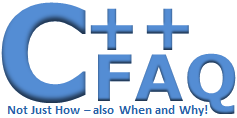FAQ: Okay, I could imagine a machine with 9-bit bytes. But surely not 16-bit bytes or 32-bit bytes, right? ←(in the new Super-FAQ)
It's in Section: Built-in / intrinsic / primitive data types:
- FAQ: Can sizeof(char) be 2 on some machines? For example, what about double-byte characters?
- FAQ: What are the units of sizeof?
- FAQ: Whoa, but what about machines or compilers that support multibyte characters. Are you saying that a "character" and a char might be different?!?
- FAQ: But, but, but what about machines where a char has more than 8 bits? Surely you're not saying a C++ byte might have more than 8 bits, are you?!?
- FAQ: Okay, I could imagine a machine with 9-bit bytes. But surely not 16-bit bytes or 32-bit bytes, right? (this FAQ)
- FAQ: I'm sooooo confused. Would you please go over the rules about bytes, chars, and characters one more time?
- FAQ: What is a "POD type"?
- FAQ: When initializing non-static data members of built-in / intrinsic / primitive types, should I use the "initialization list" or assignment?
- FAQ: When initializing static data members of built-in / intrinsic / primitive types, should I worry about the "static initialization order fiasco"?
- FAQ: Can I define an operator overload that works with built-in / intrinsic / primitive types?
- FAQ: When I delete an array of some built-in / intrinsic / primitive type, why can't I just say delete a instead of delete[] a?
- FAQ: How can I tell if an integer is a power of two without looping?
- FAQ: What should be returned from a function?
